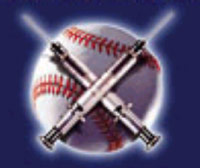I'm an asshole. And it's not for nothing. I'm an asshole because I'm a cynic and I'm a cynic because I always try to figure out why stuff happens and after I figure out why stuff happens I then try to figure out why other stuff related to that stuff happens. And on and on. This pattern of digging is always depressing because the answer to my first question always weakens my faith in humanity. And so does the next answer. And the next one.
 Life sucks.
Life sucks.
But being an asshole has its rewards. For example, I've figured our how to eliminate steroid use in baseball.
Before we begin, a little background. Manny Ramirez is being suspended fifty games for testing positive for a substance banned by Major League Baseball, which means he has to forfeit about $7.7 million of his salary.
Forfeit to whom, I wondered.
I emailed TJ Simers with the LA Times. TJ emailed me back promptly. The exchange went like this:
My email: Who gets Manny's $7.7 million?
His email: McCourt.
Brevity is clearly the soul of wit and all that.
McCourt is most likely Frank McCourt, the owner of the Los Angeles Dodgers (Ramirez' employers for those of you who would rather masturbate with sandpaper than watch a ball game).
If Bob the Bartender screws up and poisons my drink, I'm not just going after his wallet but the wallets of everyone above Bob.Now, I've been tapping the keys about moral hazards a little on this site, but I feel a refresher may be due. A moral hazard is created when a person has no incentive to avoid a risk. Banks can loan whatever they want and not worry about if the government will bail them out. That's an example of a moral hazard. And so is the following:
If an owner signs a juicer, and that juicer receives a 50-day suspension without pay, that juicer's money goes back to the owner. So why not sign a suspected juicer?
Seriously, what does it hurt? Either you get PED-aided homeruns or you're back where you started. There's no risk for the owner and that means we got us a bonafide moral hazard.
Now some may say that the owner shouldn't be punished because the fact that his employee is cheating is not his fault. But here's the deal: that's not how life works.
If Bob the Bartender screws up and poisons my drink, I'm not just going after his wallet but the wallets of everyone above Bob on that bar's food chain and that includes the owner.
If I am unscrupulous in my line of work, believe you me it ain't gonna be me paying out the claim. It's gonna be someone with deeper pockets. The owner of the business I work for is liable for my actions. That's just how life rolls.
Now, baseball writers and anti-steroid pundits are screaming out: what can we do to stop all this ‘roiding in baseball? How can we fix it so that our stars don't cheat?
Luckily for you, I have got the answer:
You hold the owners accountable.
How many owners would sign a guilty juicer when they know that if he tests positive again, not only will they lose the player for 50 days but also the player's salary for that same time frame?
Probably none.
And likewise, how many players would get all ‘roided up if they knew that a positive test would eliminate their job entirely?
Probably none.
This is how you police corruption and cheating. You don't throw money at the problem. You don't reward laziness and you don't create stupid zero tolerance policies. You let the free market decide by honoring the contract and you fine the player for the money the owner would have to pay.
So, under my system, you have an owner paying for nothing and a cheater getting nothing. Therefore, the two people with the most to lose in the equation, both employer and employee, get screwed when ballplayers ‘roid up. Incentive to look the other way is gone, moral hazard is eliminated, and baseball is cleaner as a result.
Now, this wouldn't be a perfect system. Some owners would take risks on suspected juicers, it's true. But do you really think they wouldn't monitor the hell out of their investments so that such violations never occur again?
I know I would.
No need to thank me. Solving the world's problems is its own reward.


